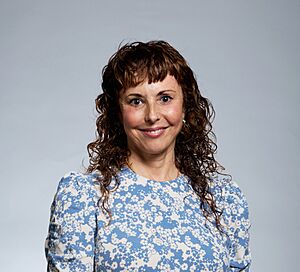Sarah Tabrizi facts for kids
Quick facts for kids
Sarah Joanna Tabrizi
FMedSci FRS
|
|
|---|---|

Sarah Tabrizi in July 2024
|
|
| Born |
London, UK
|
| Alma mater | Heriot-Watt University University of Edinburgh University College London |
| Known for | Research into neurodegeneration, particularly Huntington's disease |
| Spouse(s) | Michael Nath |
| Awards | Fellowship of the Academy of Medical Sciences, 2014 MRC Millennium Medal, 2022 Fellowship of the Royal Society, 2024 National Academy of Medicine, 2024 |
| Scientific career | |
| Fields | Neuroscience |
| Institutions | UCL Institute of Neurology; National Hospital for Neurology and Neurosurgery |
| Thesis | Mitochondrial dysfunction in the pathogenesis of neurodegeneration (2000) |
Sarah Joanna Tabrizi is a leading British doctor and scientist. She specializes in studying the brain and nervous system, especially focusing on diseases that cause brain cells to break down. Her main area of research is Huntington's disease, a serious genetic condition.
Professor Tabrizi works at the UCL Institute of Neurology in London. She is a Professor and helps lead the Department of Neurodegenerative Diseases. She also started and directs the UCL Huntington's Disease Centre. This center was officially opened in 2017. She is also a consultant doctor at the National Hospital for Neurology and Neurosurgery, where she set up a special clinic for Huntington's disease patients.
Contents
Becoming a Scientist
Sarah Tabrizi studied biochemistry at Heriot-Watt University, finishing in 1986. She then went to the University of Edinburgh to study medicine. She graduated in 1992 with top honors, receiving the Gold Medal.
Later, she earned her PhD from University College London in 2000. During her training as a brain doctor, she worked with important professors who inspired her. She focused her PhD research on how problems with tiny parts of cells, called mitochondria, can lead to brain diseases.
In 2002, she received a special fellowship to study how certain proteins called prions affect brain cells. She became a senior lecturer and consultant doctor in 2003. By 2009, she was promoted to a full Professor.
Discoveries About Brain Diseases
Professor Tabrizi is famous for her work on how brain cells get sick and die, especially in Huntington's disease. She studies how the disease works, looks for new treatments, and finds ways to measure how the disease is progressing.
Understanding Huntington's Disease
She has made many important discoveries. For example, she found out how the body's defense system plays a role in Huntington's disease. She also developed the first test for the faulty protein that causes the disease.
She led two big international research projects called TRACK-HD and Track-On HD. These studies helped scientists understand the early stages of Huntington's disease. They found signs of the disease in the brain up to 20 years before symptoms appeared. Her work also created important ways to measure the disease's progress, which are now used in studies worldwide.
In 2017, her team found a new genetic factor that affects how Huntington's disease progresses. This discovery opened up new ways to research treatments. Her current research focuses on how DNA repair mechanisms are involved in the disease. The goal is to find ways to stop or slow down the disease.
New Treatments and Gene Silencing
In 2016, Professor Tabrizi gave a talk at the Google Zeitgeist Minds conference. She spoke about her research and the exciting possibility of "gene silencing" for brain diseases. Gene silencing is a way to turn off specific genes that cause problems.
She led the first human study of a gene-silencing drug for Huntington's disease. This drug, called an antisense oligonucleotide (ASO), aims to lower the amount of the harmful protein. The positive results of this study were announced in December 2017. This news received a lot of attention from media around the world. The full results were published in a major medical journal in 2019.
Professor Tabrizi continues to explore different ways to treat Huntington's disease. This includes testing new ASOs and using gene therapy. Gene therapy involves changing genes to treat or prevent disease.
Early Detection and Staging
In 2020, she published results from the Huntington’s Disease Young Adult Study (HD-YAS). This study looked at young adults who carry the Huntington's disease gene but don't yet have symptoms. They found early signs of brain damage, even before any symptoms appeared. This research is important because it helps identify the best time to start treatments to prevent or delay the disease.
In 2022, Professor Tabrizi helped create a new system to stage Huntington's disease. This system, called the Huntington’s Disease Integrated Staging System (HD-ISS), defines the disease in four stages, from 0 to 3. It also defines the disease by the presence of the faulty gene. This new system allows doctors to conduct clinical trials much earlier. This could lead to preventing the disease before symptoms even show up.
By May 2024, Professor Tabrizi had written over 380 scientific papers. Her research has been cited by other scientists more than 39,000 times.
Awards and Recognitions
Professor Tabrizi has received many awards for her important work:
- Elected to the US National Academy of Medicine (2024)
- Elected Fellow of the Royal Society (2024)
- Arvid Carlsson Award from Lund University (2023)
- MRC Millennium Medal (2022)
- Huntington’s Disease Society of America Outstanding Research Award (2022)
- Osler Medal and Lecture from the Association of Physicians of Great Britain and Ireland (2022)
- Alexander Morison Medal from the Royal College of Physicians of Edinburgh (2019)
- Yahr Award from the World Congress of Neurology (2019)
- Cotzias Award from the Spanish Society of Neurology (2018)
- NHS70 Women Leader award (2018)
- Seventh Leslie Gehry Brenner Prize for Innovation in Science from the Hereditary Disease Foundation (2017)
- Elected Fellow of the Academy of Medical Sciences (2014)
- Elected Fellow of the Royal College of Physicians (2007)
Personal Life
Sarah Tabrizi lives in London with her husband, who is an author named Michael Nath.

